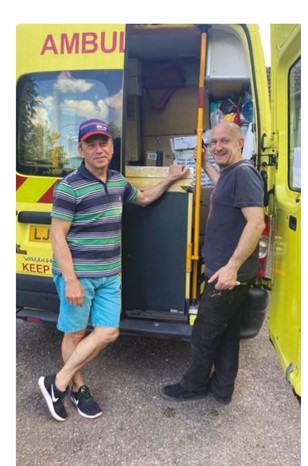Fortunately, for the past 18 years, I have been involved in the
activities of the European Society of Anaesthesiology and
Intensive Care (ESAIC), as a member and then a Chair of the
ESAIC Examination Committee and also as an Examiner of the
European Diploma in Anaesthesia and Intensive Care (EDAIC).
This meant collaborating with colleagues in all European
countries, visiting different exam centres, and presenting
at national congresses. Colleagues from Ukraine were part
of this circle and via an educational platform Medvoice
(www.medvoice.net) I was given an opportunity to present
educational and professional topics online and in person,
mainly in Odesa and Dnipro. We were setting up a difficult
airway course in Kiev in April 2022 for around 500 participants,
sharing lectures and workshops between Ukrainian and UK
colleagues. Unfortunately, this course had to be abandoned
until better times.
Instead, Ukrainian colleagues urgently switched to treating
multiple casualties, unfolding mobile hospitals, converting civil
vans into mini ambulances and more. They knew what they
were lacking; all we needed was to obtain these items, figure
out how to fund the purchases, and transport the goods to
Ukraine.
As my JustGiving fundraising account was already in place,
I promptly created a new page with an ambitious goal of
£10,000. You would not believe how quickly that goal was
reached with my colleagues, friends, social media contacts,
and their friends donating! Donations ranged from just £5
to £1000! In no time the necessary funds were collected to
purchase tourniquets, antihemorrhagic bandages, cannulas,
oral/nasal airways, self-inflating bags, pneumothorax needles,
backpacks, high-calorific food packages, etc.
My hospital procurement officers pointed me in the direction
of their supply companies, and I also found many others online.
I cannot list them here, but all gave considerable discounts the
minute it was mentioned it was for Ukraine. My garage,
my attic, and the space under the stairs soon turned into
storage units.
What now? Post by Royal Mail, DHL, or other parcel
companies? Pricy and slow. Drive my car to Ukraine myself?
Possible, but not very efficient in terms of how much can be
carried. By then I had joined several groups dedicated to
helping Ukraine, and through one of them (Help Ukraine in
Exeter) found that a local ambulance company owner, Scott
Cheadle, was driving one of his ambulances all the way to
Ukraine as opposed to the Polish border (often where such
trips ended). I reached out to Scott, and he was delighted to
take my pallets all the way to western Ukraine, where my local
colleagues retained some but also shipped to other units
and hospitals in the East and South of the country. Scott and
I became good friends and continue our cooperation to the
present day.
Later, a charity called Christian Response contacted me
offering their help. They have been helping Moldova for the
past 30 years, driving a 40-ton truck several times a year to
this country that borders Romania on one side and Ukraine
on the other. Space and weight were now not an issue, and so
it became possible to deliver much-needed supplies to the
newly formed mobile hospital that was being assembled near
Odesa.

Diamedica, a company based in the South West of England,
was extremely helpful and generous in responding to our call
for aid for Ukraine. They make very inexpensive yet simple
and portable anaesthetic machines (Glostavent DPA03) that
fit into a 14 kg suitcase and can be used in the middle of a
jungle or on the battlefield. Many years ago, as an SHO in
anaesthetics at the Gloucester Royal Hospital, I was involved
in the design and publication of the first prototype of such a
machine. Diamedica was also very generous in sponsoring me
via their charity ‘Safe Anaesthesia Worldwide’, and also gave
a massive discount to enable us to purchase two machines, a
portable ventilator, and an oxygen concentrator. These items
are now being used to give safe anaesthesia to casualties on
the battlefields of Ukraine.
Because of COVID-19, the storage units of my hospital were
full of PPE that was approaching the end of its shelf-life and
due to be destroyed. So, several tons found good use in
hospitals across Ukraine. It was transported by the above mentioned contacts, but also by Ukrainians who have lived
in the UK for many decades and who started their own
private deliveries using their minivans, 4x4s, etc. I have come
across so many established and newly formed charities both
locally, nationally, and internationally such as World Extreme
Medicine, Medics4Ukraine, Canada Way, Ukrainian Action,
and others. This work still goes on.
On the educational level, we have managed to organise
several presentations with leading European specialists,
such as Professors Paolo Pelosi, Javier Belda and Zek
Alanoglu, presenting on topics related to mass casualties,
ventilation strategies and more. Utilising my knowledge of
languages, I acted as facilitator. More topics were presented
at the traditional Pearl of the Black Sea meeting in Odesa in
September, led by Professor Oleg Tarabrin who is heavily
involved in Continuous European Education in Anaesthesia
(CEEA) Courses that are still running despite this unjust war.
The courage of my Ukrainian colleagues is simply
overwhelming, and no words can describe the types of
casualties they have to deal with on a daily basis. I know this
all too well, helping them occasionally with my professional
advice. Sadly, this war is far from the end. Therefore, do let
me know if you are willing to help in any way and I shall gladly
let you know how you can get involved. Every little help is so
important to those colleagues in Ukraine who treat military
and civilian casualties every day and risk their lives too. They
are part of the fight for their country’s freedom, for a world
without wars and tyranny.
Andrey Varvinskiy
Consultant Anaesthetist
Department of Anaesthesia, Torbay Hospital Torquay